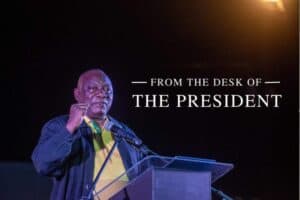By reminding the world just how important the work of Biko remains in our current society, and applying it to the world of modern jurisprudence, Joel Modiri earned himself a professorship at the tender age of 29.

A young man’s research on how Steve Biko’s black consciousness ideas are still relevant to justice, law, and social ordering, has propelled him to the highest rank in academia, making him the youngest person to hold the title of professor at the University of Pretoria.
Dr Joel Modiri, 29, was among a group of successful candidates who were promoted to associate professor as of this month, making him the youngest professor at UP Law and the entire university. To cap things off, he is also the acting head of the department of jurisprudence, where he had initially started as a tutor.
Growing up in Atteridgeville, Modiri was influenced by the historical political resistance in the area under the Pan Africanist Congress of Azania (PAC), which subconsciously led him to black political thought and critical race theory.
Later moving to Centurion where he attended primary and high school, the young professor was triggered by displays of racial authoritarianism and unfair disciplinary practices.
“Black pupils were organised in terms of good and bad apples. If you were a good apple and seen as someone who can culturally assimilate, you could progress faster, but if not, you will be a problem figure and they would systemically frustrate you,” he explains his experiences growing up.
Being a vocal pupil, he became involved in student life as a member and leader of the representative council of learners (RCL), a school governing body member, and senior prefect in charge of discipline and policy. But tragedy struck when he was 15, when his mother was killed by his stepfather who later killed himself.

Dr Joel Modiri. Picture: Supplied
“The kind of resilience and independence of mind and spirit that you develop following that kind of tragic, deep loss, gives you the kinds of competencies and capacities that you need to see things through and take things seriously,” he says.
Being a natural leader with an interest in history, politics, debating and public speaking, he says he naturally gravitated to studying law after matriculating in 2009, completing his LLB in 2013.
“I come from a family of public servants – nurses, public and government officials, social workers… The connection between having those traits associated with law, as well as being inclined to public service led me to law.”
He moved to the University of Witswatersrand as a lecturer in 2015 but was re-recruited by UP, where he decided to convert his Masters into a Doctorate.
His thesis on black consciousness and critical race theory even attracted the United Nations who invited him to speak in 2019 and 2020. His work has also been prescribed in a number of jurisprudence courses.
“People outside the university were reading my work, and engaging my work and taking it seriously. The university was forced to value my work because it wasn’t just published, but it was having an impact in legal education in South Africa and elsewhere. I was invited to talk about this research because no one was doing it and that enabled certain possibilities and higher-ups in the university.”

Dr Joel Modiri. Picture: Supplied
Now reaching the higher-ups himself, Modiri said achieving professorship at such a young age left him time to further contribute research on black consciousness and jurisprudence post-1994, with goals of completing his book on the topic.
“Career-wise, it has been quite a remarkable journey in the sense that I have been allowed and supported to do my work and research. The department is my academic home and a major place of intellectual formation as a scholar.
The task for us is to continue advancing a critical thinking of law through jurisprudence. I want to contribute to the faculties transformation goals.”
For more news your way, download The Citizen’s app for iOS and Android.
Support Local Journalism
Add The Citizen as a Preferred Source on Google and follow us on Google News to see more of our trusted reporting in Google News and Top Stories.






